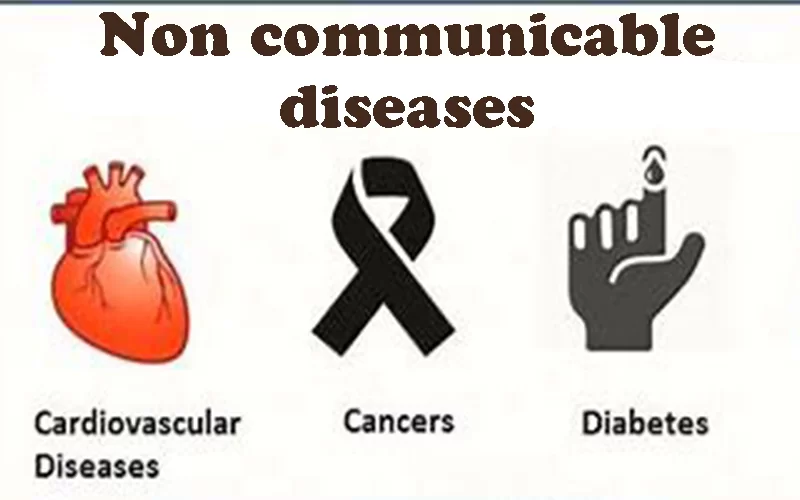Non-communicable diseases (NCDs) represent a growing global health challenge, accounting for a significant portion of morbidity and mortality worldwide. Unlike communicable diseases, NCDs are not caused by infectious agents and cannot be transmitted from person to person. In this blog, we will explore the nature of NCDs, their risk factors, preventive measures, and strategies for effective management.
What are non-communicable diseases?
Non-communicable diseases, also known as chronic diseases, are long-term medical conditions that typically progress slowly and persist over time. These diseases are not caused by infectious agents and cannot be spread from one person to another. Instead, they often result from a combination of genetic, environmental, and lifestyle factors.
Types of Non-Communicable Diseases

Common examples of NCDs include:
Cardiovascular diseases (CVDs):
Cancer:
Abnormal cell growth leads to the formation of tumours, which can develop in various organs and tissues throughout the body.
Chronic respiratory diseases:
Conditions such as chronic obstructive pulmonary disease (COPD) and asthma, affect the airways and lungs, leading to breathing difficulties.
Diabetes:
A metabolic disorder characterized by high blood sugar levels, resulting from inadequate insulin production or insulin resistance.
Mental Health Disorders:
Conditions such as depression, anxiety, and schizophrenia, affect mood, cognition, and behaviour.
Risk Factors for Non-Communicable Diseases
Some different factors that support the development of NCDs are the following:
Unhealthy Diet: Poor dietary habits, high intake of processed foods, and low consumption of fruits, vegetables, and whole grains increase the risk of obesity, cardiovascular disease, and type 2 diabetes.
Physical Inactivity:
Sedentary lifestyles and a lack of regular exercise are associated with a higher risk of obesity, hypertension, and other chronic conditions.
Tobacco Use:
Smoking and exposure to secondhand smoke increase the risk of lung cancer, heart disease, stroke, and respiratory disorders.
Excessive alcohol consumption:
Heavy drinking can contribute to liver disease, cardiovascular problems, and mental health disorders.
Genetic Predisposition: Family history and genetic factors may predispose individuals to certain NCDs, such as breast
cancer or diabetes.
Preventive Strategies
Preventing non-communicable diseases requires a comprehensive approach that addresses both individual and societal factors:
Healthy Lifestyle Choices:
Adopting a balanced diet, engaging in regular physical activity, avoiding tobacco products, and moderating alcohol consumption can significantly reduce the risk of NCDs.
Health Promotion and Education:
Raising awareness about the importance of healthy behaviours, screening for risk factors, and promoting early detection and treatment of NCDs are essential components of preventive efforts.
Policy Interventions: Governments and policymakers play a crucial role in implementing policies and regulations that support healthy environments, such as promoting access to nutritious foods, creating smoke-free environments, and investing in public infrastructure for physical activity.
Community Engagement:
Engaging communities in health promotion activities, supporting grassroots initiatives, and fostering partnerships between healthcare providers, government agencies, and community organizations can enhance the effectiveness of preventive interventions.
Management and Treatment
While prevention is paramount, effective management and treatment of non-communicable diseases are also essential for improving outcomes and quality of life for affected individuals. Management strategies may include:
Medication:
Pharmacological treatments, such as blood pressure-lowering medications, insulin therapy for diabetes, or chemotherapy for cancer, may be prescribed to manage symptoms and slow disease progression.
Lifestyle Modifications:
Encouraging patients to make healthy lifestyle changes, including dietary modifications, regular exercise, stress management techniques, and smoking cessation, can complement medical interventions and improve overall health outcomes.
Multidisciplinary Care:
Coordinated care involving healthcare professionals from various disciplines, including physicians, nurses, dietitians, psychologists, and social workers, can provide comprehensive support for patients with complex NCDs.
Patient Education and Support:
Providing patients with information about their condition, treatment options, and self-management strategies empowers them to take an active role in their healthcare and adhere to prescribed therapies.
Preventive Care:
Emphasizing the importance of ongoing monitoring, regular follow-up appointments, and preventive measures, such as vaccinations and cancer screenings, helps prevent complications and promote long-term wellness.
Conclusion
Non-communicable diseases represent a significant and growing burden on global health systems, affecting individuals, families, and communities worldwide. Addressing the complex interplay of genetic, environmental, and lifestyle factors that contribute to NCDs requires a multi-faceted approach encompassing prevention, early detection, and comprehensive management strategies. By prioritizing health promotion, fostering collaboration between stakeholders, and investing in sustainable interventions, we can work towards reducing the prevalence and impact of non-communicable diseases and improving the health and well-being of populations around the world.

